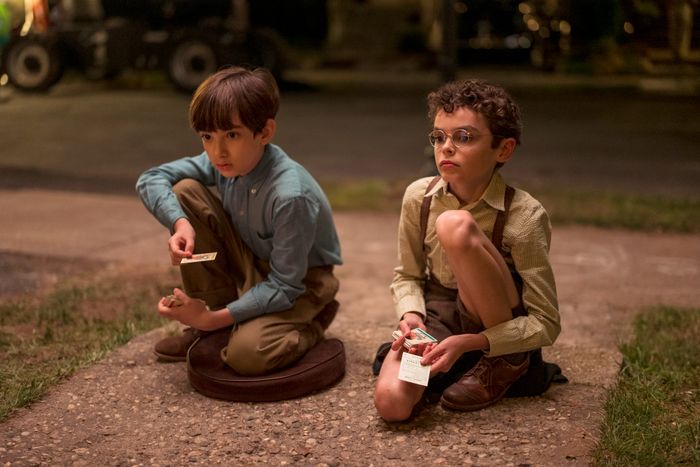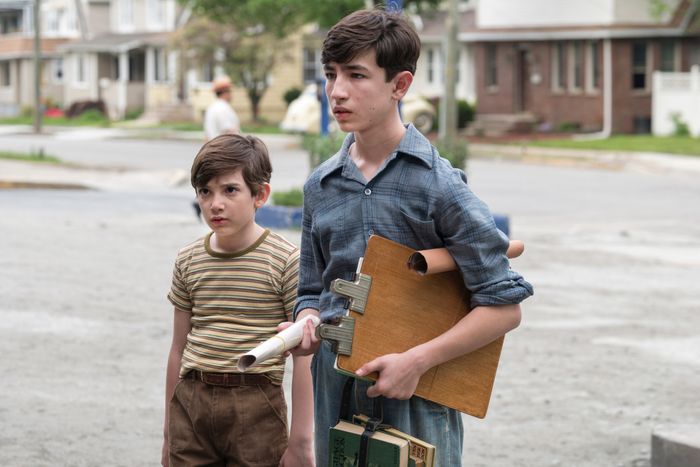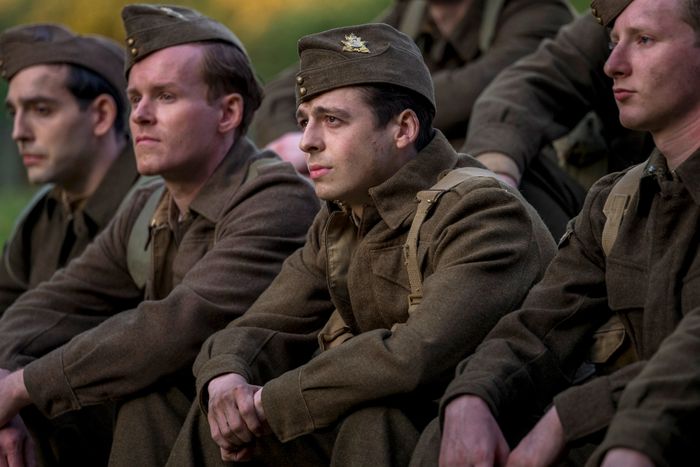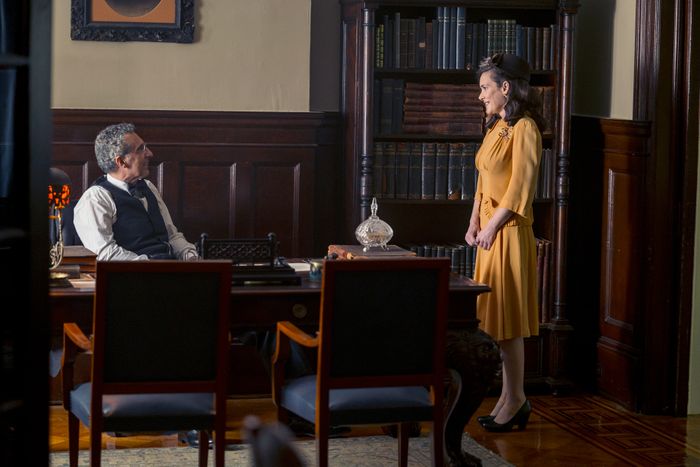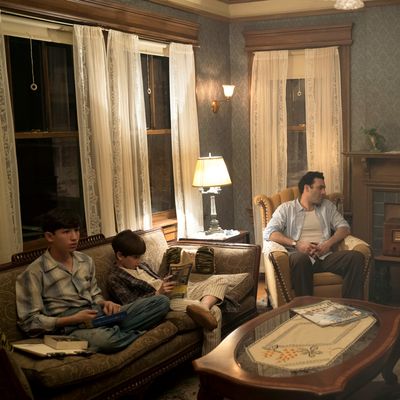
Philip Roth’s The Plot Against America vividly depicts a creepy what-if scenario: What if anti-Semite and revered wonder pilot Charles Lindbergh beat Franklin Delano Roosevelt in the 1940 presidential election on an “America First” campaign that promised to keep the United States out of World War II?
The impact of Lindbergh’s ascendancy in Plot Against America, parallel to an uprising in Fascist policy that directly seeks to uproot Jewish-Americans, is depicted as a devastating experience for the Roth family in New Jersey, as young Philip watches his loved ones clash ideologically. His father, Herman, lives in a cocoon of outrage, hanging on the declarations of his favorite radio commentator, Walter Winchell, and clinging to an all-American notion of fairness; his older brother, Sandy, starts to associate non-Jewish society with a sense of liberation; his hooligan cousin Alvin leaves Jersey to fight on behalf of the Canadians; his mother, Bess, struggles to shoulder everyone’s pain along with her own anxieties; and his Aunt Evelyn becomes romantically involved with the superstar Rabbi Bengelsdorf, who is either a forward-thinking Jewish-American leader or a pawn in a game that ensures the Jews will lose.
Having been given Roth’s blessing before his 2018 death, David Simon and Ed Burns adapt the story with great care for their HBO limited series, expanding upon characters’ stories in compelling ways and including their own personal touches. (Simon recently said that a joke in the first episode is one his father used to make all the time.) The adaptation includes many of the book’s fiery living-room arguments that provide a microcosm for a traumatized nation of people tearing itself apart, keeping Roth at the forefront. But there are key differences that may polarize the book’s fans — for one, the family’s surname is changed from Roth to Levin — so let’s look at the biggest changes.
The point of view
A major change to the storytelling comes right at the beginning, with an opening scene that establishes the various perspectives of the Levins: Philip (Azhy Robertson), Sandy (Caleb Malis), Herman (Morgan Spector), Elizabeth (Zoe Kazan), Cousin Alvin (Anthony Boyle), and Aunt Evelyn (Winona Ryder). Roth’s book, on the other hand, is told from the eyes of a young Philip Roth, while the events and experiences are processed by the author at an older age. The difference creates a new sense of how the story unfolds: The miniseries is more about the present, whereas the book is about the past. The difference in POV also allows the show to focus on characters who have comparably smaller parts in the book, like Alvin, Aunt Evelyn, and Rabbi Bengelsdorf (John Turturro).
The beer-garden incident
The explosive climax of episode one is an addition by the miniseries, fueled by a a key plot point in both the book and the show — when Philip’s family sees the “Fascist bastards” at the beer garden while touring houses in Union, an indication of Lindbergh’s uprise leading to people showing their true colors in public. Simon and Burns take this bitterness a step further: Alvin returns to Union after the same German-Americans beat up one of his friends, jumping a group of them as they drunkenly walk home from the beer garden. It plants a seed of vengeance within Alvin’s character before he goes off to war, but also provides a small victory. Though more and more Fascists are showing themselves, at least the Jews got to kick some ass.
Philip and Sandy’s grandmother
One character in particular looms over the Levin dinner table: Evelyn and Elizabeth’s mother (played by Eleanor Reissa). In the series, she’s a constant responsibility for the family, with Herman even picking her up to bring her over for dinner. Meanwhile, Evelyn feels an acute pressure to take care of her mother and keep her love life hidden from her. But in Roth’s book, the grandmother character has passed on before the book’s focal events, and therefore doesn’t push that kind of weight on Evelyn. And while the series hints that she suffered from a type of dementia, the book offers a more concrete medical history that she had “died of heart failure after a decade as a coronary invalid.”
Sandy at the Lindbergh rally
The second episode begins with an exciting moment for Sandy: He steals away to see a campaigning Lindbergh speak at a nearby airfield, aware that such an experience must be kept secret from his father. This scene, which isn’t in the book, emphasizes how Philip’s older brother will become progressively enamored with Lindbergh, a rhyme to the pilot episode’s final image of Sandy secretly drawing Lindbergh. It’s worth noting that the show adds another sanctimonious image seen from Sandy’s point of view: that of Rabbi Bengelsdorf riding a horse. This moment also doesn’t happen in the book, but it helps hint at the type of Americana that Sandy is hungry to experience for himself.
Alvin’s wartime experience
Because the book is conveyed from young Philip’s perspective, we only know about Alvin’s wartime experience from the little that Philip hears. The show uses that void as an opportunity to fill in Alvin’s backstory with numerous additional scenes of him abroad fighting with the Canadians, like giving him a love interest who allows him to talk out loud about his faith and purpose fighting in the war (“I’m here to settle an old score,” he says). Simon and Burns even go so far as to give Alvin a special mission — thanks to his knowledge of mechanics from working at the Esso gas station — involving a state-of-the-art radar device. It’s a stark departure from the mystery and nihilism in the book’s account, which offers little detail about Alvin’s wartime experience except for when Uncle Monty (played in the show by Dave Krumholtz) gets Alvin to share the embarrassing story of how he got his leg blown off.
Alvin’s added radar skills are brought back into the end of the story in a big way that diverges from Roth’s book, related to the tracking of Lindbergh before he disappears. Recruited for a mission that is never entirely laid out for him, Alvin winds up in the middle of the Lindbergh conspiracies and British assassination plot that swirl around the last episode of the series. They also have him running back to Minna and her father, Schapp, asking, “Am I family?,” as both an emotional reassurance and a need for an alibi in case anyone wants to know where he had been the last three days. It’s a significant addition as well, because it shows Alvin’s desire for heroism coming full circle, faced with something far more sinister than his initial desire to use war to settle the score.
Aunt Evelyn and Rabbi Bengelsdorf
Alongside the show’s added attention to the lives of Evelyn and Rabbi Bengelsdorf, it fills out more of a backstory for their growing relationship and also how Evelyn is not a very practiced Jew. “We weren’t observant,” Evelyn says about her family, in between scenes that indicate that she’s a little clueless about what to do at the synagogue, inspiring Rabbi Bengelsdorf to gift her a copy of The Guide for the Perplexed by Maimonides. As a result, Evelyn’s arc offers a more pointed thematic exploration about identity, and about why people like Evelyn and her nephew Alvin consider themselves Jewish. As Alvin says in one episode, “I’m a Jew because I was born a Jew.”
In later episodes, their relationship is about the influence that Rabbi Bengelsdorf has over Evelyn. In particular, the series adds a beat where he encourages her, with a nod, to dance with German minister Herr von Ribbentrop during the infamous White House gala. The series brings their relationship full circle by not making Rabbi Bengelsdorf virtually disappear after his arrest, as he does by the end of the novel, but instead stand in front of a sparsely attended synagogue populated by the likes of Evelyn. The scene that follows, in which Bengelsdorf pleads with two skeptical synagogue officers by sharing what he believes to be true — that the Nazis kidnapped Lindbergh’s baby years earlier, held the child hostage, and orchestrated Lindbergh’s political rise — is a condensing of what a frantic Evelyn tried to tell the Levins in the book, what the news reported, and what Rabbi Bengelsdorf was informed by First Lady Lindbergh to tell the world before he himself was arrested.
Escape to Canada
When Lindbergh rises to power, some of the Jewish families in the book and the show consider fleeing to Canada, another topic that becomes divisive in the Levin household. The show raises this idea earlier in the timeline than the book does, with Herman’s projectionist friend Shepsie (Michael Kostroff) stating in episode three that he’s got a plan to move north — and then encouraging Herman to follow suit. While Elizabeth is a proponent of this idea in both versions of the story, the show takes it even further by adding a scene in which she sneaks away to New York City’s Canadian Consulate, putting the family on the preferred immigration list made possible by Alvin joining the Canadian army. To show Elizabeth’s own urgency to move to Canada, the show also has a beat where she suggests they go to Canada instead of taking the planned family trip to Washington, D.C., that later provides the third episode its distressing climax.
Seldon Wishnow
One of Philip’s most significant relationships in The Plot Against America is with his neighbor Seldon Wishnow (Jacob Laval), specifically because the young Levin boy can’t stand him. But while the series maintains the wincing awkwardness that Philip always feels when Seldon talks to him, Philip’s disdain — a projection of his own fears of weakness — goes even deeper in the book. At one point in the novel, Philip even starts to steal Seldon’s clothes in an uncertain plan that terrorizes Seldon with each missing point of clothing, dressing up like him and trying to be him. An important change comes at the end, in which Philip gifts Seldon his beloved book of stamps, as a gesture of friendship, grappling with the loneliness that awaits Seldon in Kentucky. In the novel, Philip does no such thing: His stamp book disappears during a bout of sleepwalking, in which he gets kicked in the head by a horse and almost bleeds to death. Seldon sees this happen and alerts his parents, causing Philip to admit, “My parents organized my rescue, but Seldon saved my life.” At the very end of the novel, Philip considers Seldon’s time at the Levin house after the Winchell Riots and his mother’s murder, making a reference of his previous tending to Alvin: “The boy himself was a stump … I was the prosthesis.”
The ending
Roth’s book concludes on a personal note about young Philip’s childhood, with Seldon being welcomed into the household. The alternate history of the time, however, then course-corrects with the timeline of real history, as FDR is reelected as president after Lindbergh’s disappearance and then eventually leads America into World War II and to victory. With the series’ expansive point of view, Simon and Burns turn their focus to how America is altered by the events of the story as a whole, which leads to its somber, disturbing final montage where the next election is shown to be rigged, with ballots burned and Roosevelt-friendly voters turned away from the polls. It’s not just the answer of who becomes the next president that goes up in flames in this added expression of cynicism, but the sense of whether corruption can truly lose in America.


